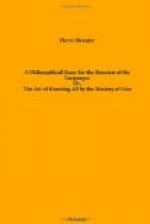’Tis by their Principles I reduce to naturall reason all imaginable ways by which words alter their primitive signification to imbrace another, either more inlarg’d or reserv’d, or never so little diversifi’d either in Proportion or Alliance; for tis no easie matter for words to travell from one Country to another without meeting with the same casualties, that use to befall forreign Plants which, are seldome remov’d into a new soile, but degenerate and either lose some of their Native virtue, or acquire some new. But most people having met wich this generally proposall, to expresse at first appearance, what they think with as little trouble as is possible, it thence falls out that to ingrosse a great deal of sense in a few words, they scarce allow enough precisely to marke out the simple ideas of their minds, fitted out to all their severall resemblances, they that are most simple in themselves, are commonly compounds in their significations, neither is there any one of the least considerable, but what is diversify’d in each Language by a thousand different modifications.
From thence proceed all the methods of inflexion, derivation, and composition that give being to the most subtle kind of Sophistry; all the species and forms of Nouns, Verbs, and particles that make up the oeconomy of a Language, together withall diversity of Numbers, Genders, Cases, tenses, Modes, and Persons which have more of Art than at first sight is imagin’d, for the Custome of Nations hath not only authoriz’d these inventions to vary the Cadence of words, but with an admirable facility to expresse all the deflexions, by which an Idea of the same object may be represented to our conceptions according as it admitts of a mixture of resemblances, which it may have either to its effects or Causes, or as it is related to the severall estates, wherein it subsists, to the differences of time or place, and to all the circumstances that may accompany it, either within or without us. As the more sensible differences of the Languages principally consist in all these modifications; so one of the greatest secrets of this Art is to know how choisly to select and distinguish, both in our ideas and in the words that expresse them, that which is principall and essentiall from what is purely accessory, subtly to difference the first ideas from the second, the second from the third, the simple from the Compound, the primitive and Originall signification from its dependences and references, its modifications and divers restrictions, in one word (if I may so expresse it) not to confound the habit with the person. For in a manner these modifications are the same words, that the habit is to the body; this new dresse that is given to forreign words to fitt them up alamode to the Country, for the most part time so disfigures them and renders them so obscure, that they impose as well upon our eyes as ears, and passe for origalls and Natives of the Country, although in reality they are borrow’d from our Neighbourhood, and sometime from beyond the seas.




